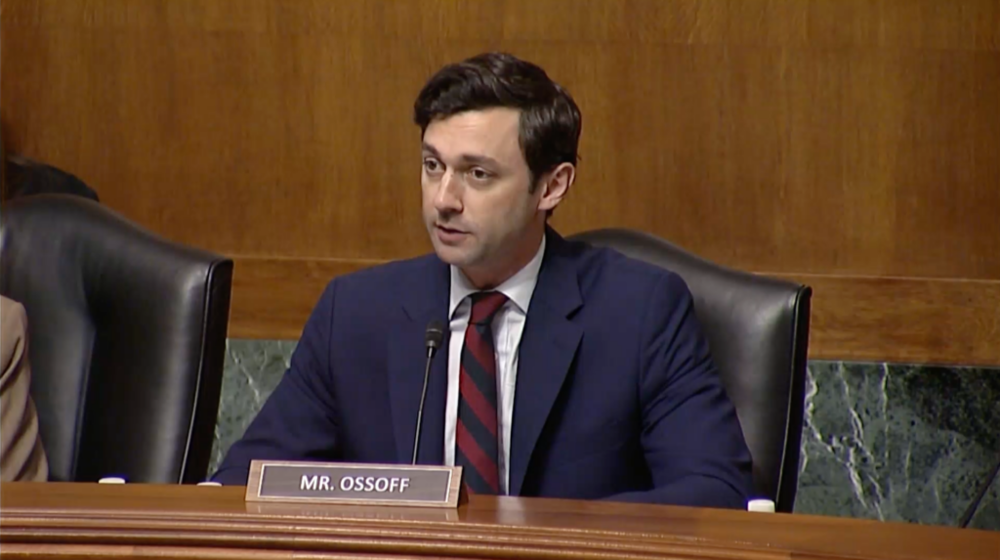
Section Branding
Header Content
Georgia child welfare agency gets scathing performance reviews at Ossoff human rights hearing
Primary Content

The Georgia Division of Family and Children Services only met risk assessment and safety management obligations 16% of the time according to a previously undisclosed audit, said Sen. Jon Ossoff, as he chaired a meeting of the U.S. Senate Human Rights Subcommittee on Wednesday.
The details came from an ongoing bipartisan probe into the safety of foster kids in Georgia that began in February, Ossoff said.
“This is an investigation about children, the most vulnerable children in our nation,” Ossoff said. “Orphaned children. Children who have faced the most extreme forms of abuse and neglect imaginable. Children who have been abandoned. Children who rely upon state agencies and federal policy, which oversees those state agencies, as their last hope for safety.”
“What we have learned is happening to children in the state’s care and in the care of state agencies across the country is heartbreaking,” he added.
Emma Hetherington, director of the Wilbanks Child Endangerment and Sexual Exploitation Clinic at the University of Georgia School of Law, said children she has worked with have experienced a litany of horrors, including being placed in solitary confinement with no therapeutic oversight after a suicide attempt and being handcuffed during an intravaginal ultrasound to confirm pregnancy after being trafficked.
She said another child was prohibited from going to school in a placement approved specifically for trafficking victims “in order to protect students and school employees from their promiscuity.”
“While my clients may not have suffered these acts of abuse and neglect at the hands of DFCS employees, DFCS knew about this treatment and they did nothing to stop it or remedy it. Instead, they have blamed my clients for their fear, anger and victimization,” Hetherington said.
Hetherington said she does not intend to blame individual case managers and other DFCS employees.
“However, DFCS’ overarching structure, internal policies and administrative barriers obstruct their good work, and when this happens, our clients experience extreme harm,” she said.
Georgia Department of Human Services Director of Communications Kylie Winton declined to comment on the hearing.
Georgia mom Rachel Aldridge stopped to wipe away tears as she testified about the death of her 2-year-old daughter Brooklyn in 2018. Brooklyn’s father’s girlfriend, Amanda Coleman, was sentenced to life in prison for the young girl’s murder after she died from blunt force trauma to her head.
Aldridge said Brooklyn never should have been in her care, and DFCS ignored her pleas as well as their own policies in keeping her there.
“The system meant to protect children failed Brooklyn at every level, from management down to caseworkers, repeatedly,” Aldridge said. “They failed to follow the policies meant to keep my child safe and violated our rights. Brooklyn’s death cannot be in vain. I am here today to seek change.”
Ossoff said DFCS should have informed Aldridge that she had the right to object to her daughter’s placement. He said they failed to act when Aldridge reported that Coleman had been using drugs and Brooklyn had bruising on her leg, and that they failed even to run a background check on Coleman.
“DFCS had a policy requiring it to run background checks on people who take care of children. But DFCS didn’t run that background check, did they?” Ossoff asked. “And if they had run a background check, they would have found that Ms. Coleman had a criminal history and that DFACS had previously pursued a child neglect case against her.”
About 11,000 Georgia children are in foster care, said Melissa Carter, clinical professor and executive director of the Barton Child Law and Policy Center at Emory University School of Law, and that number is trending upwards. Those kids will spend an average of 19 months separated from their families, higher than the national median of 17 months.
“Behind those numbers are real whole people, as you all have recognized,” Carter said. “The data doesn’t give us that up close understanding of how the system impacts their lives, like the heartbreaking testimonials we’ve heard today. Those stories are difficult to take in, but they are not outliers. The child welfare system is complex. There are multiple failure points.”
Carter said Georgia could do more to give case managers the tools they need and listen more to children and families, but there are also two major systemic conditions that illustrate mismanagement in the system.
The first is that Georgia does not reliably measure or monitor child victimization.
“We’ve lost our bottom line metric for success in our primary mission, child safety, because we don’t reliably make that determination,” she said. “And without it, we have less confidence in conclusions about how effective the agency is when it intervenes in families.”
She said the state should also do more to invest in preventing harm to children, giving the example of federal TANF block grants.
“Georgia could spend the money in direct support to families and prevent children from entering foster care, but instead, Georgia is content to withhold the money from families and use it to pay only after a child suffers harm,” she said. “These spending choices may keep us compliant with federal requirements, but they impede our ability to transform our child welfare system into one that promotes children’s healthy development through prevention and family strengthening.”
John DeGarmo of Jasper County, founder of the Foster Care Institute advocacy group, said hiring more caseworkers and trying harder to retain them could go a long way.
“Agencies are overworked, overwhelmed, under-resourced, under-supported and understaffed,” he said. “Many times, they’re not able to give the support services foster parents need so foster parents quit because foster parenting is a very demanding lifestyle.”
DeGarmo also suggested continuing to provide services for a period after reunification with family.
Ossoff said his investigation is ongoing.
In 2020, Georgia approved a nine-year plan to reduce the state’s high rate of child abuse and neglect, and the lawmakers have continued to consider changes to foster and adoption law since the state’s 2018 adoption overhaul.
The state Senate’s Adoption and Foster Care Study Committee is set to meet Oct. 26.
This story comes to GPB through a reporting partnership with Georgia Recorder.

